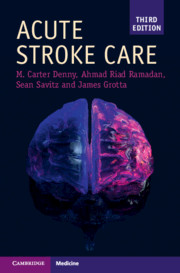Book contents
- Acute Stroke Care
- Acute Stroke Care
- Copyright page
- Contents
- Preface to the Third Edition
- Abbreviations
- Chapter 1 Stroke in the Emergency Department
- Chapter 2 What to Do First
- Chapter 3 Ischemic Stroke
- Chapter 4 Stroke Radiology
- Chapter 5 Intravenous Thrombolysis
- Chapter 6 Endovascular Therapy
- Chapter 7 Neurological Deterioration in Acute Ischemic Stroke
- Chapter 8 Ischemic Stroke Etiology and Secondary Prevention
- Chapter 9 Transient Ischemic Attack
- Chapter 10 Less Common Causes of Stroke
- Chapter 11 Cerebral Venous Sinus Thrombosis
- Chapter 12 Intracerebral Hemorrhage
- Chapter 13 Subarachnoid Hemorrhage
- Chapter 14 Organization of Stroke Care
- Chapter 15 Stroke Rehabilitation
- Chapter 16 Transition to Outpatient Stroke Care
- Book part
- Further In-Depth Reading
- Index
- Plate Section (PDF Only)
- References
Chapter 9 - Transient Ischemic Attack
Published online by Cambridge University Press: 28 October 2019
- Acute Stroke Care
- Acute Stroke Care
- Copyright page
- Contents
- Preface to the Third Edition
- Abbreviations
- Chapter 1 Stroke in the Emergency Department
- Chapter 2 What to Do First
- Chapter 3 Ischemic Stroke
- Chapter 4 Stroke Radiology
- Chapter 5 Intravenous Thrombolysis
- Chapter 6 Endovascular Therapy
- Chapter 7 Neurological Deterioration in Acute Ischemic Stroke
- Chapter 8 Ischemic Stroke Etiology and Secondary Prevention
- Chapter 9 Transient Ischemic Attack
- Chapter 10 Less Common Causes of Stroke
- Chapter 11 Cerebral Venous Sinus Thrombosis
- Chapter 12 Intracerebral Hemorrhage
- Chapter 13 Subarachnoid Hemorrhage
- Chapter 14 Organization of Stroke Care
- Chapter 15 Stroke Rehabilitation
- Chapter 16 Transition to Outpatient Stroke Care
- Book part
- Further In-Depth Reading
- Index
- Plate Section (PDF Only)
- References
Summary
Transient neurological symptoms often present a difficult diagnostic dilemma. It is often difficult to tell if the transient symptoms were due to ischemia or due to something else (see Chapter 1). Usually, by the time the physician sees the patient, the neurological exam has returned to normal. On the other hand, it is critically important not to miss the diagnosis of transient ischemic attack (TIA). TIAs may provide an opportunity for physicians to intervene and prevent an ischemic stroke and subsequent disability, and must be taken seriously. The search for an etiology must be done expeditiously. Just as angina may serve as a warning for future myocardial infarction, a TIA is often a warning sign of an impending stroke.
- Type
- Chapter
- Information
- Acute Stroke Care , pp. 153 - 159Publisher: Cambridge University PressPrint publication year: 2019



